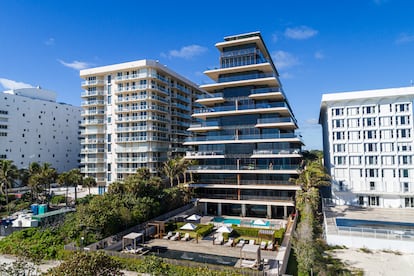The wealthy Latin Americans shaking up Miami’s real estate market
Political change across the Americas is encouraging the elites to take their money out of their countries and invest it in areas that are considered safer

Political upheaval in Latin American countries has led to many of their wealthiest residents taking money out of their countries – a trend evidenced by their luxury properties in Miami, Florida. Over the last year and a half, while the global economy has been suffering historic lows, Miami has witnessed a boom in real estate purchased by Latin Americans. Brokers and realtors say this is not like any investment wave seen before. On this occasion, buyers are turning their investment into their new permanent residence.
Serving presidents and the candidates to replace them have struck fear into the wealthy elite of Latin America. In Mexico, President Andrés Manuel López Obrador has alienated big business and wants to cancel contracts with private companies. In Peru, President Pedro Castillo sacked the more radical elements in his government under pressure from the markets. In Chile, a new constitution is being drawn up at the same time as a leftist candidate for the presidency, Gabriel Boric, is topping the current polls. In Colombia, Iván Duque’s government has been the focus of long and bloody protests, paving the way for left-wing candidate Gustavo Petro to challenge him for the presidency.
The outflow of capital from the region is difficult to measure, but it is evident on a day-to-day basis. Currencies have been depreciating over the past year, some more so than others. Several investment banks have decided to cease operations and foreign banks have been swamped with requests to open accounts abroad. For many people, the easiest way to move their assets overseas is to invest in property, and in Florida, 34% of foreign real estate purchases come from Latin America, according to the National Association of Realtors (NAR).
“We are currently witnessing a very significant resurgence in the Latin American market,” says Sergio Pintos, head of sales at Waldorf Astoria Hotels & Resorts in Miami. Colombia, Peru and Ecuador are the three biggest markets for Pintos and his team: 16% of purchases at their 100-story flagship hotel in Miami have been made by Mexicans. “As a result of the economic and political issues in each particular country, people are spreading out and diversifying their investments and they are looking to bring some of that investment to Miami. Among these investments is real estate,” Pintos adds.
The coronavirus pandemic exposed Latin America’s weaknesses. On the one hand, lockdowns highlighted the informal and precarious nature of the lives of a large part of the population. Public health systems buckled under the strain of Covid-19 admissions and the slowness with which governments laid their hands on stocks of vaccines revealed their scarce capacity for cooperation and lack of clout on the international stage.
On the other, the poor living conditions of many reached boiling point. In Brazil, Peru, Chile and Colombia, huge protests were stoked by poverty and inequality, leading to a shake-up of the political landscape with the rise of polarizing, radical and in some cases authoritarian figures, generating uncertainty and mistrust among the richest strata of society.
Investment and residency
“Miami is benefitting from the decentralization caused by the pandemic and this has acted as a catalyst for one of the biggest increases in Latin American immigration to the city,” says Yamal Yidios, founder and managing director of real estate firm Ytech. “What I am seeing is that what interests Latin Americans has evolved from investing and having a second home in Miami to living and working here.”
In many cases, Yidios explains, Latin Americans who traveled to Miami during the pandemic to get vaccinated discovered that they could work from there remotely. According to a report by real estate company International Sales Group, Florida welcomed 950 new residents per day in 2020, both from within the United States and abroad, attracted by the state’s climate and low tax rates. “The city has evolved from being a financial district and a vacation destination to becoming one of the most important centers of technology, business ventures and innovation where Latin Americans of every socio-economic level want to be.”
Chile and Colombia
Pintos and Yidios both agree that there is a new market that is rapidly gaining strength: Chile. “Chileans, because of their culture, traditionally invest in Chile. Now, although it not a major player, there is an increase in the number of Chileans looking to buy,” says Pintos. Over the last two months, he adds, he has held interviews with Chilean realtors looking to specialize in selling property in Miami from Chile.
“What Chilean buyers have told me is that this is fundamentally a political issue,” Pintos says. “Because they believe there could be a radical change in the economy starting next year, based on political factors. This is the reality.” Furthermore, he adds, the Colombian market, which over the course of the past decade has not been among the strongest, has come back significantly over the last 12 months, driven by social and political concerns.
Rise of cryptocurrencies
The use of cryptocurrencies has become so commonplace that people are already purchasing properties in this way, says Merrick Theobald, spokesman and vice president of marketing for bitcoin payment service provider BitPay. Through online platforms such as condos.com, many Latin Americans are making property purchases with cryptocurrency. “When the value of their cryptocurrency rises, people like to use their profits to buy something, commonly luxury items or property. They buy jewelry, a car, but also residences,” says Theobald.
“We are witnessing, particularly this year, an increase in transactions from Latin American countries,” he adds. “These are regions with many bitcoin holders and are displaying increasing trust in bitcoin due to its decentralized nature, something that people prefer over the authorities.”
Tu suscripción se está usando en otro dispositivo
¿Quieres añadir otro usuario a tu suscripción?
Si continúas leyendo en este dispositivo, no se podrá leer en el otro.
FlechaTu suscripción se está usando en otro dispositivo y solo puedes acceder a EL PAÍS desde un dispositivo a la vez.
Si quieres compartir tu cuenta, cambia tu suscripción a la modalidad Premium, así podrás añadir otro usuario. Cada uno accederá con su propia cuenta de email, lo que os permitirá personalizar vuestra experiencia en EL PAÍS.
¿Tienes una suscripción de empresa? Accede aquí para contratar más cuentas.
En el caso de no saber quién está usando tu cuenta, te recomendamos cambiar tu contraseña aquí.
Si decides continuar compartiendo tu cuenta, este mensaje se mostrará en tu dispositivo y en el de la otra persona que está usando tu cuenta de forma indefinida, afectando a tu experiencia de lectura. Puedes consultar aquí los términos y condiciones de la suscripción digital.









































